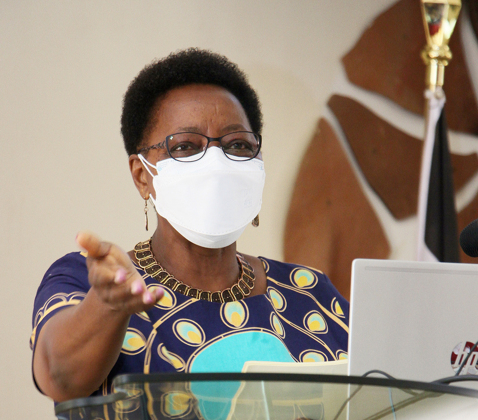OBSERVANCE OF THE 2023 INTERNATIONAL DAY OF THE WORLD’S INDIGENOUS PEOPLES
The National Gender and Equality Commission joins Kenya and the world at large to celebrate the International Day of the World’s Indigenous Peoples. The event is marked every year on the 9th day of August. The day was adopted in December 1994 by UN General Assembly resolution 49/214 to raise awareness of the needs of Indigenous people. The theme for 2023 is "Indigenous Youths as Agents of Change for Self-Determination,". United Nations notes that the theme ‘underscores the role that indigenous youths play in forging their communities' path toward self-determination. It recognizes their unique contributions, heritage, determination, and resilience.
Indigenous Peoples are distinct social and cultural groups that share collective ancestral ties to the lands and natural resources where they live, occupy, or from which they have been displaced. According to the World Bank, Indigenous Peoples make up approximately 6% of the global population[1]. In Kenya, Indigenous people are communities that self-identify or are classified under the category ‘marginalized communities’ defined under Article 260 0f the Constitution of Kenya. These communities have invaluable knowledge and resources on forest management, soil restoration, biodiversity, cultural heritage, and organic methods for sustainable agriculture, just to mention a few.
Youth including the indigenous youths have long been recognized as determinant of development and a key driver for the realization of Kenya’s Vision 2030 and sustainable development[2]. The Constitution of Kenya, 2010 protects the right of youth to self-determination, cultural heritage, and participation in decision-making processes that affect their lives. Specifically, Article 55 of the Constitution of Kenya mandates the State to take measures, including affirmative action programs, to ensure that the youth; ‘access relevant education and training; have opportunities to associate, be represented, and participate in political, social, economic, and other spheres of life; access employment; are protected from harmful cultural practices and exploitation; develop their cultural values, languages, and practices; and have reasonable access to water, health services, and infrastructure’, among others. Article 56(a), recognizes the right of minorities and other marginalized groups to participate and be represented in governance and other spheres of public life.
The Kenya Youth Development Policy (KYDP), 2019 recognizes the diversity of Kenya youth and advocates for the creation of a supportive social, cultural, economic, and political, environment that will empower the youth to be active actors in national development. Kenya is a party to various human rights treaties and conventions. The African Youth Charter, for example, requires State parties to create or strengthen platforms for youth participation in decision-making at local, regional, and continental levels of governance and to ensure equal access to young women and men to participate in decision-making.
Indigenous youth harbour aptitudes to foster positive change, spur social cohesion and shape the future of their communities. They possess a profound understanding of their local ecosystems and play a role in safeguarding the environment by preserving traditional conservation practices and resource management techniques handed down by past generations. Their unique perspectives, creative ideas, and unwavering determination are instrumental in forging a path toward self-determination and sustainable development. Indigenous youth are powerful advocates of environmental and cultural conservation.
Through grassroots movements and global platforms, they have advocated for policy changes and recognition of their rights as key stakeholders in environmental protection and climate action. Further, through innovations and investments in digital spaces, indigenous youth have provided solutions to the complex issues faced by their communities in the modern world while preserving their rich cultural heritage and traditions.
Despite their potential and the existence of strong policy and legal frameworks, indigenous youth continue to suffer marginalization, discrimination, and limited access to basic services and opportunities, hindering their full potential and active engagement in decision-making processes. They are often underrepresented in decision-making spaces both at the national and local levels.
As we commemorate this day, the National Gender and Equality Commission invites the Government and other stakeholders including civil society, the private sector, and the international community, to continue collaborations with indigenous youth to maximize their potential. This involves providing access to quality education, healthcare, and livelihood opportunities, while simultaneously involving them in the preservation of their cultural heritage and traditional practices. We need to recognize and embrace their unique identities and aspirations and empower them toward a more equitable and sustainable future.
We also call upon the Government to hasten the implementation of legal frameworks and policies that safeguard the rights of indigenous youth, including their right to self-determination, representation, and participation in decision-making processes. On our part, the National Gender and Equality Commission affirms its commitment to continue promoting and protecting the rights of indigenous peoples in all spheres of life. Together, we can create an inclusive and equitable society where all individuals, including indigenous youth, contribute meaningfully to sustainable development.
Dr. Joyce M. Mutinda, PhD. EBS.
ChairpersonTop of Form
[1] https://www.worldbank.org/en/topic/indigenouspeoples
[2] Kenya Youth Development Policy,2019


Comments